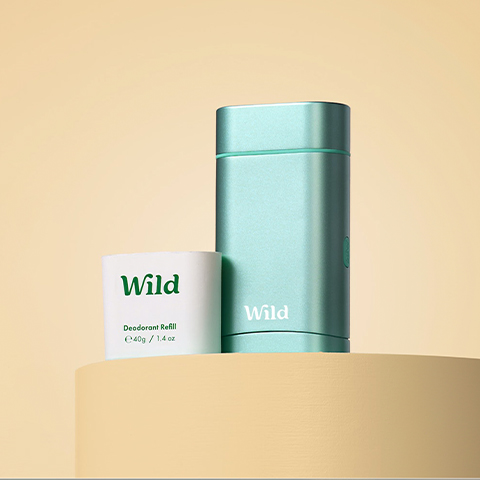Wild is packed with all the best natural ingredients to keep you smelling fresh and your underarms dry. However, at Wild, we know sweating is a natural and normal function and so we don't want to stop it. We’re going to dive into the science of sweat and to start, let's understand why you smell when you sweat and why sweat is normal.
First off, there are two different types of sweat glands in our bodies that create different types of sweat.
Eccrine Sweat Glands
These are found all over the body mostly in the soles of your feet, the forehead the palms and cheeks. The sweat produced is a watery fluid and produced for the function of evaporative cooling to control body temperature. This sweat is odourless and is for no other purpose
Apocrine Sweat Glands
These are found in the armpits and groin regions and develop during puberty. This sweat differs to the sweat made from eccrine sweat glands; in that it secretes an (thick, waxy, greyish substance which is diluted by fluid from other glands nearby) oily substance containing lipids & proteins that fosters the right environment for smelly bacteria to grow and create a strong, unpleasant smell – hence the creation of the big ‘B’ - body odour. So, it's not really the sweat that smells, it's the action of bacteria on apocrine sweat that becomes prevalent after puberty.
We love things that are natural at Wild, and nothing is more natural than a bit of sweat! But let’s look at the different types of sweat in this Sweat Guide 101:
Normal Sweat
Although no one particularly enjoys it, sweating is a completely normal bodily function to allow the body to regulate its temperature after physical activity or hot surroundings. In fact, the average person sweats between 0.5 to 2 litres of sweat per hour when during exercise. But not just that, people may lose a minimum of 3 litres of sweat per day, just by simply doing nothing! It is your autonomic nervous system that prompts your eccrine glands to release sweat when it is experiencing an increase in temperature, whether that’s from exercise or being in a hot environment. The sweat from eccrine glands is odourless with the sole purpose of allowing heat loss through evaporation – not making your body stink! It is instead the bacteria produced by sweat that allows for a lovely atmosphere for bacteria to grow.
Stress sweat
Sweat glands are activated by your body’s nervous system and hence when you are experiencing certain emotions, hormones, and other stressors, your body is more likely to sweat. In addition, when your body is experiencing stress, its temperature will rise and therefore prompting your sweat glands to kick in. It is the apocrine sweat glands that are more prominent in the process of ‘stress sweating’, hence why you might notice yourself being a bit pongy after being under a stressful situation or feeling particularly hormonal. Your underarms in fact secrete around 30 times more sweat when your body is under stress.
Why children don’t sweat
Because the body generally doesn’t develop apocrine sweat glands until puberty, children do not produce the type of sweat that creates BO hence why they don’t go smelly after exercise. In addition, the sweat glands in children are closer together in comparison to an adult, therefore their sweat is more likely to evaporate quicker and hence making them more efficient sweaters.
Teenage sweat
The question we all ask ourselves - why do teenagers stink? This all boils down to entering the world of puberty. Not only is this when the body starts to develop apocrine sweat glands in the groin and armpits to create a lovely environment for bacteria and thus BO, but unfortunately for teenagers, the body’s sweat glands also become much more active during puberty which contributes to an increased amount of sweating. It is very normal for teenagers to sweat a lot and as a result produce more BO, hence why teenagers’ bedrooms are usually ones to avoid at all costs.
Menopause Sweat
An increase in sweat is an extremely common thing to experience when your body is going through menopause. I’m sure we’ve all heard either our mums or grandmothers complain about a hot flush taking over as they struggle their way through menopause. In fact, around 75-85% of woman experience increased sweating and hot flushes when going through menopause or perimenopause. This is because hormonal changes can alter the part of your brain that regulates your body temperature to make it more sensitive to temperature changes. It is likely that women going through menopause will sweat when experiencing a hot flush which are the moments where the body’s hormones are affecting its ability to regulate temperature and hence women experience moments of very high temperatures, activating the body’s sweat glands.

